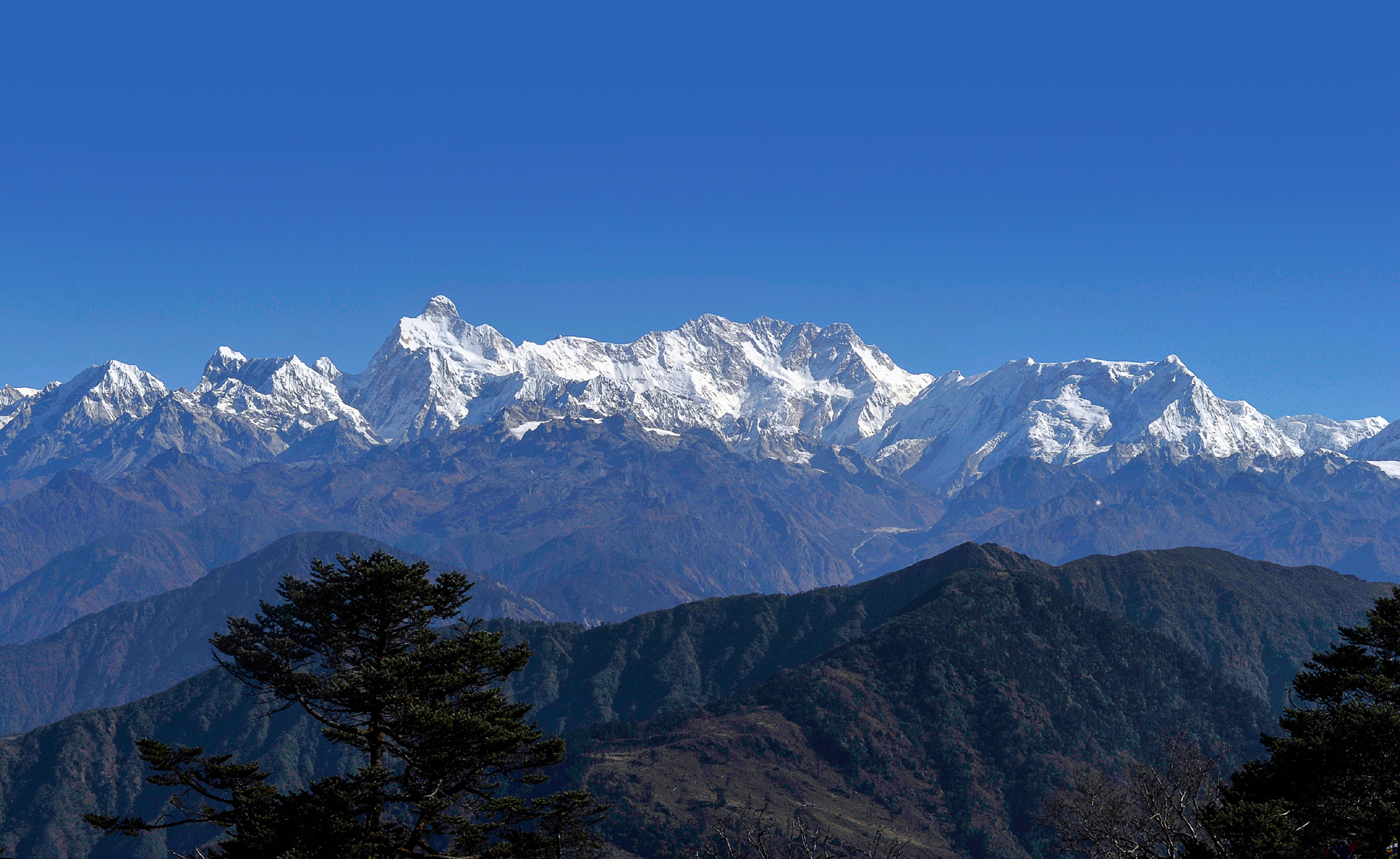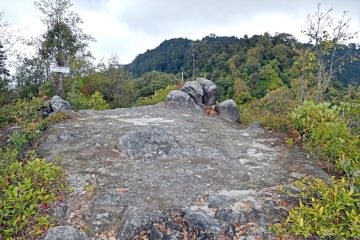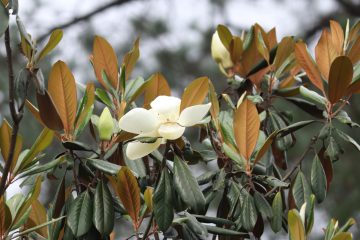
- Bhogendra Lingden
Soon after the creation of the entire universe and earth, plants and animals, Supreme Goddess Tagera Ningwaphuma created Mujingna Kheyongna, the primordial woman by kneading the birds droppings and ashes of mountain bamboo[1]in a cliff. She is described as the first human woman originated out of soil and stone.
The daughter of the highest Himalayas, the baby girl Mujingna Kheyongna was, all but alone in the world. She had no one to take care of her, but only herself. What a lonely and poor girl! But, she had the blessing of her creator, Tagera Ningwaphuma. Time went on. She was growing every day. When she turned five years old, she felt the need of clothes. She went to the divine world of her creator and begged her for clothes. Tagera Ningwaphuma, the owner of the loom was busy in weaving the clothes. Her majestic hands and feet were gently moving the loom and her splendid fingers were enchantingly sorting out the threads in the loom. Mujingna fell under the charm of the great harmony of the motion and music of the loom.
The creator god gently smiled at her daughter Mujingna. There was a divine glow in her face. She lovingly took Mujingna by her side and taught her weaving in the loom that required the harmony of mind and body and skilful balance of the movement of hands and feet. Mujingna learnt to weave clothes and learnt to make shawls and gunyu (long skirt like dress) and retuned back her world.
Time went on in the Mujingna’s world. She was living alone in the world. She had no siblings, no father and mother. Every day she was growing. Every year she was growing pitifully without friends and family. When she reached at the age of twelve, her body endured a rapid physical changes. Her height increased swiftly, with the growth of her breast and hips. She felt hungry and thirsty all time. The age of adolescence started having its impact on her. As her sexual desire culminated, she increasingly grew restless, lonely, and bored. She desperately wanted a male companion to satisfy her physical hunger and thirst. Sad and lonely Mujingna went in every direction in search of a male companion to satisfy her desire. She went as far as “Sinyuk Muden” (China and Tibet in Limbu Language) in north and “Temen” (Terai and India in Limbu language) in south. She went towards the east direction from where the sun rises every morning, she went towards the west from where the sun sets every evening. But she could not find anyone.
Mujingna was as in her full bloom, as beautiful as the spring flowers of the mountains. Her voice was as sweet as the mountain waterfalls. But her splendid beauty and vigour was of no use as she could not find any other human beings in the world, especially a male companion for her. She moved as swiftly as a flying butterfly. Finally, our youthful maiden, the first heroine of the mankind, sat sad and solitary under a big tree on a top of a hill. The tree had a big and long horizontal branch just above the ground. She placed her one leg on the ground and another on the branch. She blew a melancholic and sad music from a wild leaf that came deep from her heart. The whole mountains and forest echoed with the tune of the sad music. A strong desire of longing for a partner became so intense that she started whistling in the air.
Seeing all these, Tagera Ningwaphuma had a pity on Mujingna, who was her daughter, her own creation. Supreme Goddess understood that her daughter reached at the stage of adolescence, and she needed a companion. So, she sent the spirits of gods in the form of a gentle wind to satisfy the hunger of the maiden, thirst of the youthful lady. A soft breath of air gently touched her genitalia. At that very moment, she became pregnant by the grace of Supreme Goddess, by the divine will. Cool breeze of the mountains relieved Mujingna from her sexual desire. She felt new vigour and vitality and returned her home.
But this was not the end of her trouble. Mujingna was unknown about her pregnancy. As months passed, she felt strange changes in her body. She started craving for sweet roots. She craved for white soil of the ground. As the foetus of her womb moved, she felt constant fatigue and irritation. She got angry quite often for no reason. Awestruck Mujingna wondered what could be growing inside her, inside her womb. How could she be pregnant for she had not met any man in her whole life? She couldn’t think of anything. She lost her mind.
She went to the divine world of her creator and inquired about her own condition. She asked the goddess the reasons behind all these strange things happening to her. Goddess advised Mujingna to sleep placing the pillow towards the goddess’s feet. She told her that she would get a dream vision about her condition, and about her future as well. Mujingna obeyed and made her bed near the feet of the Goddess and went in a deep sleep. In the morning, Mujingna woke up and informed the Goddess about her visionary dream in the night, “My creator, I am pregnant, there is a baby growing in my womb. This was what I dreamed in the night.” Goddess answered, “What a good dream ! You really had a good vision. Now you may go back to your world. Take these rice seeds and millet seeds. Sow them in the soil and harvest when ripe. You can consume them as your food and liquor during your postnatal period”. The goddess taught her sowing and harvesting skills, food and liquor making skills. Mujingna, delighted by the divine counsels, returned her world.
Mujingna cleared the trees and bushes and sowed the rice and millet. The crops grew well and thrived. Harvesting the crops, Mujingna stored them for future use in need. She prepared homemade rice and millet wine. When she was 10 months pregnant, she had labour pains. Enduring the severe labour pains, she sometimes held the door of the house tightly biting her teeth, sometimes she firmly gripped the rungs of the ladder. Finally, she fastened a mountain bamboo strap in the wooden beam of the house, and she hung herself in the strap with her legs apart. She gave birth to a baby boy.
The baby got thinner and leaner ever day and every night instead of growing up and gaining weight. The baby turned so small that even a palm became big for him. Mujingna was stunned by this. She could not think of anything and went to Tagera Ningwaphuma and asked, “Who is the father of this baby? Why is this baby losing weight every day? Why is he not growing up”? Divine mother replied, “Oh Mujignama Kheyongnama ! You do not have a conscience and intellect at all. Sleep tonight placing your pillow near my feet. I will give you a vision in your dream”. Following the instruction of the divine mother, Mujingna slept placing her head towards the goddess’s feet. Through her dream vision, Mujingna learnt the boy was the son of wind and his name was Susuben Lalaben. The baby should be reared in cradle with the wild cypress leaves as his bed. This way, the baby would grow in normal way.
Mujingna came down and performed the rite of Yangdang Phongma (naming and purifying the newborn baby). The baby boy formally obtained his name as Susuben Lalaben from his mother. She made a cradle with bamboo canes and baby bed from cypress leaves. She kept the baby in the cradle and started swinging the cradle and singing lullaby melodiously. Gradually, the baby gained weight gradually and started growing up normally.
When Susuben Lalaben reached the age of four, he asked for clothing. Mujingna weaved clothes and gave him. He was a curious boy, curious for playing and hunting around. The first hunter of the humankind, Susuben Lalaben, learnt to make and use bows and arrows. He began hunting insects, frogs, lizards in the early days. He used to ask his mother whether those animals were suitable to eat or not. Mother used to reply to him that they were not edible food for human beings and threw them. One day he saw two Himalayan bulbul birds sitting together in a tree, one white crested and another black. He hunted down the black coloured male bulbul. He brought the hunted bird home and asked his mother whether it was edible prey. Mujingna learnt that her son had killed a male companion from the pair of birds, she felt a sharp pain in her heart of being alone, without a companion. She told him that the prey was edible, but he had committed a dreadful sin by his careless act of killing one bird from the pair. He had caused never healing wound of widowhood and separation in the humankind. Tearful Mujingna passionately looked at the bird lying dead on the ground and cried bitterly. Limbus believe that this was the reason for the birth of widowhood and separation in the human world.
Susuben Lalaben started thinking of going for a distant places in north and south for hunting. His mother instructed him to devise proper equipment and skills required for the long hunting endeavours. He improved his bows and arrows and quivers. He asked Himalayan monal bird for the poison for his arrows. His mother also suggested him to have dogs as his companion for hunting. He went to a top of a hill, whistled, and called out five dogs. The dogs were Paratangna, Kidhitangna, Kebatangna, Makyutangna, and Tekketangna.
With his hunting tools and dogs, Susuben Lalaben entered into the deep forest in the northern direction, towards high mountains. Chasing a deer, he crossed many hills and rivers and reached in the village of Thosulungma Phiyanglungma. Phiyanglungma was busy in weaving clothes in her loom when a deer came running towards her loom and broke the threads of her loom by its sharp horns. The deer got stuck in the threads of the loom. Phiyanglungma killed the deer by hitting it with her pointed weaving shuttles and hid it covering under her skirt. Soon after, Susuben Lalaben’s dogs showed up there. She lured the hunting dogs with food and hid the dogs under her basket.
Following the footsteps of the deer and his dogs, Susuben Lalaben appeared before Thosulungma Phiyanglungma. He fell under the charm of the beautiful Phiyanglungma. He asked if she had seen the deer and his dogs. The shy maiden expressed her ignorance about the deer and dogs. Susuben Lalaben pointed out the fact that footsteps of the deer and dogs had been rightly disappeared from her place, so he insisted that they must be somewhere around there. Then Phiyanglungma asked him to introduce himself as who he was and where he was from. He replied that he was the first among the hunters in the whole mankind and his name was Susuben Lalaben. He added that he was also known as Sawangemba Yukpungemba. Hearing this, Phiyanglungma insisted him to call his dogs by his hunter’s sign language, if he were a hunter. Susuben Lalaben whistled and called his dogs. The dogs came running out of the basket towards their master. Phiyanglungma admitted that she killed the deer as it had damaged her weaving looms. She took the dead deer out of her skirt and handed to him.
Phiyanglungma said, “Oh gentleman, the first among the hunters in the whole mankind, you must have been hungry and tired of long journey as you have come across the many hills and mountains. Please take rest for tonight in my hut. I will prepare food and wine for you.” Susuben Lalaben agreed the kind proposal of the maiden. Phiyanglungma ordered her maid attendant Susanglina to prepare food and wine for the guest. Susanglina cooked the meat of the deer, prepared hot wine, and soupy rice. They had their dinner. After the dinner, Susuben Lalaben and Phiyanglungma chatted for a long time. Laughing and teasing, and seducing each other, both of them had a physical relation in the night.
In the charm of the newly met young maiden, Susuben Lalaben forgot to return home. He stayed with her for a quite long time. Phiyanglungma got pregnant. She started craving for sour and pungent food due to her pregnancy. One day, Susuben Lalaben and maid attendant Susanglina went to forest in search of sour and pungent food for Phiyanglungma. In the meantime, Susuben Lalaben copulated with the maid in the forest. Susanglina, also got pregnant. Phiyanglungma gave birth to a son in due time. He was named as Sutchhuru Suhampheba. Susanglina also gave birth to a son. He was named as Samdangkhewa.
Susuben Lalaben, then, went downwards towards southern plains. The same mythic story repeated there as he had in the north. There he met another beautiful maiden Yosulungma Mukkumlungma and her maid attendant Tusanglina. Like Phiyanglungma, Mukkumlungma killed the wounded deer, hid the dead deer and the hunting dogs. When Susuben Lalaben showed up and inquired about the deer and his dogs, she too initially expressed her ignorance about them. But Susuben Lalaben called them through his sign language by whistling out. Hearing the whistle of the master, dogs came out of the basket, running towards him. Mukkumlungma took the dead deer out of her skirt and handed to him. Everything happened in the same way. Hosting the guest with food and warm wine, soupy rice, and deer meat. After dinner, time for fun. The newly met couple had sexual relationships in the first night. Mukkumlungma craved for sour and pungent food due to her pregnancy. When Susuben Lalaben went with Tusanglina in search of sour and pungent food, they too had physical relationships in the forest. Tusanglina, also got pregnant.
Everything same, every events recurred for this mythical hunter. Was there any difference? Yes, this time one of the babies begotten was a girl. Mukkumlungma gave birth to a daughter in due time. She was named as Tetlara Lahadongna. Tusanglina also gave birth to a son. He was named as Lingdangkhewa. Time went on in its own course. Our primordial hunter took care of his family, he fed them hunting animals every day.
Susuben Lalaben was not content staying in a place for a long time. He liked to have hunting adventures. He was the first hunter of the mankind. How could he stay in a home for long time? He was born for hunting; hunting endeavours ran through his veins. He was a man born with hunting spirit. So, one day he asked his wives Mukkumlungma and Tusanglina to prepare essential foodstuffs for his hunting journey. Both maiden had a bitter feeling hidden deep in their heart that the man favoured and loved the other maiden more than herself. Mukkumlungma thought this way. Tusanglina thought this way. So, instead of readily agreeing and giving him the essential foodstuffs, they showed each other for the job. This was the birth of envy and jealousy in the human world, Limbus believe. They become so jealous that they could not think of the grave consequences of their action that their belove husband may die due to hunger in the long and difficult journey.
Without foodstuffs, sad and disheartened Susuben Lalaben got ready to leave for his hunting journey. In the meantime, both maidens asked as who would take care of them in his absence. They wanted his role as a responsible guardian of the family, an ideal person for parenting. But the nomadic hunter Susuben Lalaben found the way. He told that Mukkumlungma would be looked after by her attendant Tusanglina and his daughter Tetlara Lahadongna would be looked after by his son Lingdangkhewa. Was it a good work division in the family? The nomadic hunter may have found it the only best alternative.
Susuben Lalaben left his southern home and family. His loyal dogs followed their master. He reached his northern home and asked for essential foodstuffs for his journey. Oh! What a pity? Same feeling of envy and jealousy had ravaged this home too. When he requested Phiyanglungma for foodstuffs, she replied, “Oh! Why don’t you ask your darling wife Susanglina? She would manage foodstuffs for you.” Susanglina also replied in the same manner pointing to Phiyanglugma. Heartbroken by such cold response from his northern maidens, Susuben Lalaben got ready to leave. The maidens demanded to manage as who would look after them in his absence. He told that Susanglina would take care of Phiyanglungma and Samdangkhewa would take care of Sutchhuru Suhampheba. Just in a same manner he had done in his southern home, he devised the household responsibilities.
Heartbroken Susuben Lalaben, carried his hunting bows, arrows and spears and left for hunting without essential foodstuffs. His dogs followed the footsteps of their master. In search of prey, he left for further north towards the Himalayas. He crossed many hills and mountains. He crossed many rivers and streams. But he could not find any animals. On the eighth day of his hunting adventure, exhausted, hungry, and thirsty Susuben Lalaben could not move ahead. He was too weak to walk further. So, he kept his bows and arrows aside and sat down to rest in a place. He lay down on the ground.
When the dogs saw their master lying down on the ground, they gathered around him. Bewildered dogs had initially thought that their master was sleeping. But their master did not wake up as in the usual sleep. Hours passed, days passed, but Susuben Lalaben did not wake up from his deep sleep. Indeed, he must have been dead soon after he had lain down on the ground. Finally, when the dead body started to rot, and strange smell came off from the corpse after seven days, the dogs realized that their master was no more. After that realization, the dogs decided to find their own way in the absence of their master. Among them, the dog named as Paratangna went to the hillside and became a wolf, another dog Kidhitangna went to the steep rocks and became a jackal. Similarly, the third dog Kebatangna went to the forests in the southern plains and became a tiger, and the fourth dog Makyutangna found his place in the trees and became a bear. But the fifth dog Tekketangna went to Mujingna Kheyongna’s place and informed her of tragic fate of her son. Eventually, Tekketangna turned into a domesticated dog for the humankind.
When the loyal dog Tekketangna narrated the whole incidents of ill-fated journey of the first hunter, Mujingna Kheyongna burst into tears. Her grief was overwhelming. Out of her grief and anger, she was determined to make the wrongdoer maidens face the grave consequences of their jealousy and selfishness. She went to the place where the dead body of her beloved son was lying. When she saw the dead body of her son, she could not control herself. Tears flowed down from her eyes like the flooded Tamor river. She cried bitterly for long-
Oh, first hunter of the humankind!
Hey! Susuben Lalaben!
My beloved son!
Born from the light of the sun
You have become the sun
Born from the light of the moon
You have become the moon.
After long time of lamenting on the death of her beloved son, Mujingna finally got up and decided to bestow boon to him. She proclaimed that her every organs to become different objects-
May your feet become wild bamboo
May your toes become grass
May your fingers become sweet potato
May your intestine become creepers in the trees
May your ears become mushroom
May your hairs turn into broom grass
May your eyes turn into rosary peas
May your backbones turn into cliffs.
Finally, Mujinga offered proper burial service to the dead body. Then she went to both directions where the maidens were living. She blamed Phiyanglungma, Susanglina, Mukkumlungma and Tusanglina for killing her son. She condemned them for not providing him material support required for hunting. She thought envy and jealousy of the maidens had actually killed him. So, she cursed that there would be unnatural deaths of human beings caused by incest and stillbirths and suffer from mental disorder and adultery. This is the time when the curse began in the human society.
On the way back her home, tired and grieving Mujingna took shelter in a mountain cave. There evil and ghostly spirits attacked her and she died. Mujingna Kheyongna, the primordial woman born out of ashes and soil, returned to ashes and soil. The first heroine of the humankind, who used to sing sad melodies alone in the hills and forests died alone in the cave.
Adapted from:
[1] Scientific name – Himalayacalamus asper, locally known as malingo nigalo
Aangbung, D. B., editor. Yakthung Samjik Mundhum. Sodhunge Lepmuhang Phedangma Janapa Sangh, 2022.
Kaila, Bairagi. Mujingna Kheyongna Mundhum. Limbu Sahitya Ra Sanskriti Utthan Tatha Prakashan Samaj, 2071 BS.
Yakthumba, Manjul. Mundhum Ra Mithakharu [Mundhum and Myths]. Manjul Phombo Yakthumba, 2013.




